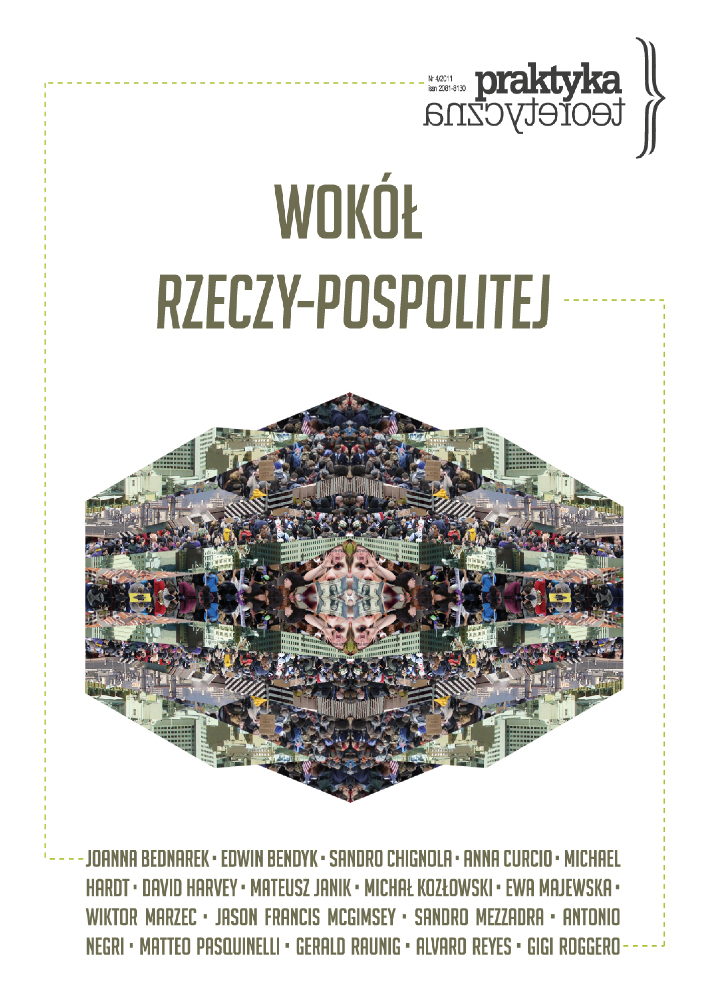Abstract
I propose a discussion of some feminist observations concerning the book Commonwealth by Negri and Hardt. I focus on the issues of biopolitical labor and the topics developed in feminist analysis of reproductive and care labor, I also suggest, that there are problems regarding the body and sexuality, that need to be solved. In my discussion of the book I also rise some problems concerning the conditions of occupying the position of the excluded, and the colonial exclusions in particular, I refer to some observations made by Gayatri Spivak in her essay Can the Subaltern Speak?. As an extremely interesting proposition of emancipatory theory, I think that the project of Negri and Hardt need to be discussed, also from the perspectives I have mentioned.
References
Adorno T., M. Horkheimer. 2010. Pojęcie oświecenia. W Dialektyka oświecenia: fragmenty filozoficzne. Warszawa: Wydawnictwo Krytyki Politycznej.
Anzaldua G. 2011. “Borderlands”. Signs. Journal of Women in Culture 37 (1).
Benhabib S., D. Cornell. 1998. Feminism as Critique. New York: University of Minnesota Press.
Butler J. 2008. Uwikłani w płeć: feminizm i polityka tożsamości. Warszawa: Wydawnictwo Krytyki Politycznej.
Butler J., Spivak G. 2007. Who Sings the Nation State?: Language. Politics. Belonging. London: Seagull Books.
Federici S. 2010. „Niestabilne zatrudnienie: perspektywa feministyczna”. Przegląd Anarchistyczny 11 : 165-172.
Foucault M. 2000. Czym jest oświecenie?. W Filozofia. historia. polityka: wybór pism. Warszawa-Wrocław: Wydawnictwo Naukowe PWN.
Hardt M., A. Negri. 2005. Multitude: War and Democracy in the Age of Empire. New York: Penguin Books.
Hardt M., A. Negri. 2012. Rzecz-pospolita: poza własność prywatną i dobro publiczne. Kraków: Korporacja Ha!art.
Hardt M., A. Negri. 2009. Commonwealth. Cambridge: Belknap Press.
Hooks B. 2012. Teoria feministyczna: od marginesu do centrum. Warszawa: Wydawnictwo Krytyki Politycznej.
Irigaray L. 1977. Le marche des femmes. W Ce sexe qui n’en n’est pas un. Paris.
Jaggar A. M. 1983. Feminist Politics and Human Nature. Oxford.
Majewska E. 2011. “BorderXing with Gloria Anzaldua”. Signs. Journal of Women in Culture 37(1) : 34-41 .
Marks K. 1968. Do L. Feurbacha w Bruckbergu 11 sierpnia 1844 r. W K. Marks. F. Engels. Dzieła t. 27. Warszawa.
Moraga Ch. 2011. “Loving in the War Years” Signs. Journal of Women in Culture 37(1).
Spivak G. 1999. A Critique of Postcolonial Reason: Toward a History of the Vanishing Present. London: Harvard University Press.
Spivak G. 2011. „Czy podporządkowani inni mogą przemówić?”. Krytyka Polityczna 24-25: 196-239.
Środa M. 2003. Indywidualizm i jego krytycy. Warszawa: Fundacja Aletheia.
License
“Theoretical Practice” seeks to put into practice the idea of open access to knowledge and broadening the domain of the commons. It serves the development of science, thinking and critical reflection. The journal is published in open-access mode under the CC-BY-NC-SA 4.0 license (detail available here: http://creativecommons.org/licenses/by-nc-sa/4.0/). Articles published in the journal may be freely distributed, stored, printed and utilized for academic and teaching purposes without restrictions.
They should not be, however, used for any commercial purposes or be reconstructed into derivative creations. Access to the journal may not be limited or offered for a fee by any third party.
Prospective authors are obliged to fill in, sign and send back the publishing contract compliant with the CC licencing. [PL.pdf, PL.doc, EN.pdf,EN.doc].
According to this contract, authors grant the journal a non-exclusive right to publish their work under the creative commons license (CC-BY-NC-SA 4.0) without any financial obligation on both sides of the contract.
Before submission authors should make sure that derivative materials they use are not protected by copyright preventing their non-commercial publication. Authors are responsible for any respective copyright violations.
